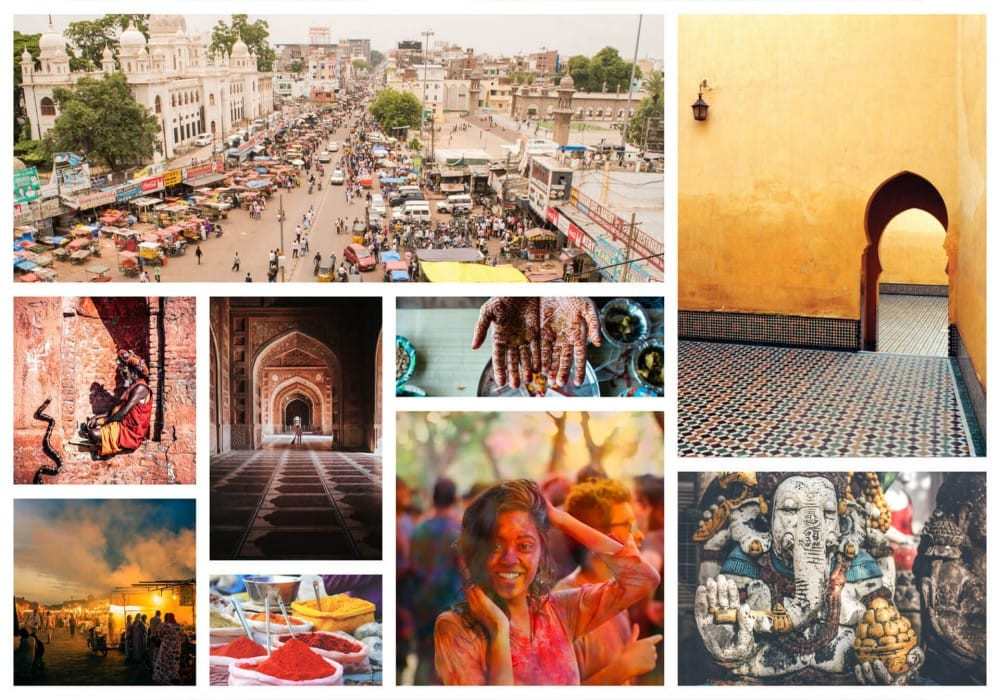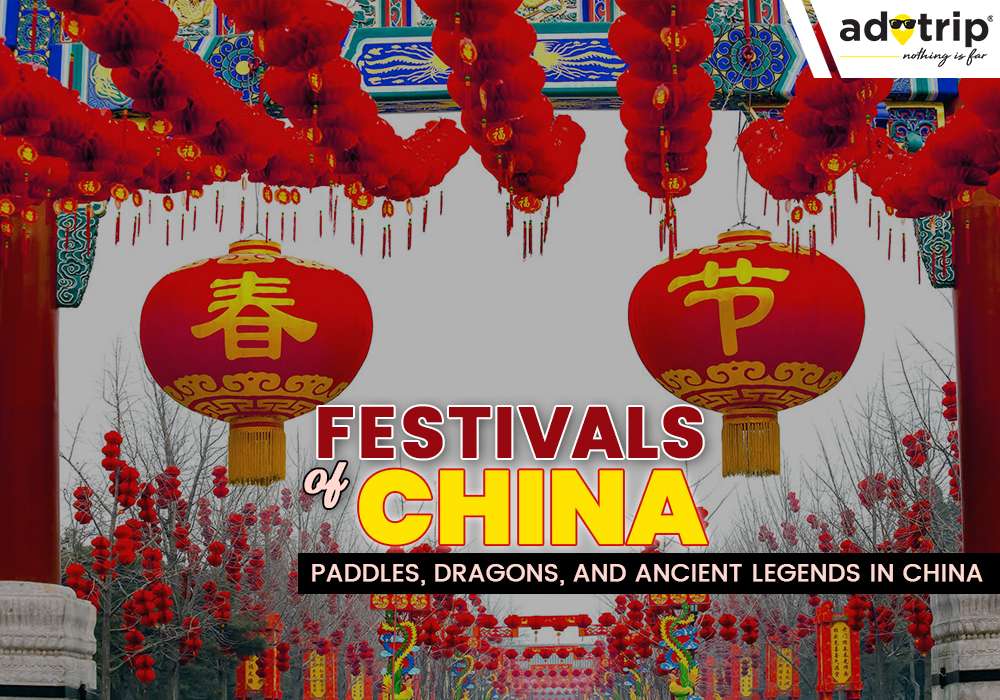
Last Updated At: 14-Dec-2023
11 Fun Facts About The China | Culture, History & People
The most populous nation in the world, China has a vibrant cultural history and a developing economy. It has been a hub of creativity for thousands of years, helping to create things like paper, gunpowder, and the compass. This country's vast and varied landscapes are home to thriving cities, historic sites like the Great Wall, and beautiful natural wonders, including the Yangtze River and the karst landscapes of Guilin. China's modernisation has largely impacted technology, manufacturing, and international trade, leading it to become an economic powerhouse.
List Of 11 Most Interesting Facts About China
More than 8,000 years have passed since the establishment of China. Furthermore, China has a sizable population that is quickly changing from a closed nation to one that could rule the modern world. Some fascinating, strange facts about China can pleasantly surprise you.
Read More: Festivals Of China
1.The fascinating meaning of silk
Silk is immensely important to China, indicating a strong economy and a rich cultural heritage. China has been the world leader in silk manufacturing for over 5,000 years, and the Silk Road helped it spread worldwide. This pricey material represents class, wealth, and diplomacy. Silk is a timeless symbol of China's history and influence on the world, considering the problematic process of silkworm cultivation and weaving, demonstrating the country's craftsmanship and creativity.
2. Fun sports facts about China
China has a long history in athletics, with several noteworthy accomplishments. With numerous medals from the Olympics and World Championships, it is well recognised for winning the sport of table tennis. The nation holds Several Olympic gold medals and excels in weightlifting, gymnastics, and diving. The Beijing Olympics in 2008 served as a showcase for China's athletic excellence on a worldwide scale. Yao Ming's success in the NBA and their love of basketball contribute to China's dynamic sports scene.
3. Things that were established throughout the History of China
China has established tremendous accomplishments throughout its history. The Great Wall, built in the seventh century BC, is a well-known representation of China's ancient defences. The imperial examination system influenced the country's bureaucracy, which dates back to the Han Dynasty. The Silk Road linked China to the rest of the globe by promoting trade and cultural exchange. Taoism and Confucianism became well-known schools of thought that had a lasting impact on Chinese civilisation.
4. Interesting colour facts in Chinese culture The Chinese new year
Chinese culture gives a lot of cultural significance to colours. Red is frequently used during Chinese festivals like the Chinese New Year to symbolise luck and joy. Gold is a symbol of success and fortune. White is a colour that represents grief. Yellow is a regal and powerful colour. Green symbolises progress and peace. Black can represent negativity or seriousness. Spring Festival, Chinese New Year, is a colourful holiday marked with red decorations, customary dragon dances, and family get-togethers. It is a time of regeneration and hope as it ushers in the lunar new year.
5. Fun Facts about China and Bicycles
Bicycles and China have an intriguing history together. Millions of bicycles were on the streets in the middle of the 20th century, making them a significant form of transportation. As a result, China has been dubbed the "Kingdom of Bicycles." The "Bicycle Kingdom" campaign of the government promoted cycling for environmental benefits. Despite the rise in vehicle ownership, China is increasingly focusing on promoting electric bikes to reduce traffic congestion and pollution.
Read More: Best Beaches In China
6. Unusual Chinese Martial Arts
Kung Fu, a Chinese martial art, has distinctive features. "Drunken Fist"-style assaults imitate intoxication for unpredictability. The "Five Animal" designs imitate animal motions. Qigong focuses on managing energy. Shaolin monks were the first to combine Kung Fu with spirituality. The quiet movements of Tai Chi belie its beginnings in warfare. These disciplines represent China's unique and diverse approach to martial arts.
7. Interesting facts about Chinese food
Chinese cuisine has a long history and is very diverse. Ingredients like tofu, rice, and noodles are essential. The "Eight Culinary Traditions" highlight local cuisine. Numerous little dishes are available in dim sum. For example, Kung Pao Chicken balances the sweet and sour flavours. The renowned dish Peking Duck is delicious. Chinese food also promotes harmony by incorporating yin-yang principles and harmoniously mixing textures, colours, and tastes.
8. Civilisation, writing and mathematics facts
Beijing is a bustling city that is rich in history. It has a long history of rich civilisation and serves as the capital of China. The city's importance extends to the development of writing and mathematics, as shown by its prehistoric writings and scientific accomplishments. The Great Wall and the Forbidden City, two well-known structures in Beijing, are examples of the city's rich cultural past. Because of the harmonious blending of tradition and modernity, Beijing is a fascinating hub of historical and intellectual treasures.
9. Animals in Chinese traditions
In Chinese culture, animals have a profound symbolic meaning. The dragon symbolises power, strength, and fortune, usually connected to rulers. The tiger personifies bravery, while the phoenix stands for beauty and grace. The smart rat has been compared to the loyal dog, which represents loyalty and protection. The significance of these animals in folktales, visual arts, and zodiac signs exemplifies how Chinese civilisation is a complex fusion of cultural values.
10. Facts about birds
With more than approx 1300 bird species calling China's diverse landscapes home, its avian variety is astounding. The majestic and rare red-crowned crane is known for representing longevity, while the colourful mandarin duck represents love and devotion. Birds have incorporated themselves into China's culture and ecosystems, from the frantic cityscapes to the peaceful rural areas, capturing the attention of both inhabitants and nature lovers.
11. Unusual tree facts
There are fascinating tree phenomena in China. The "Immortal Tree" of Ginkgo Biloba, famous for withstanding the bomb blast at Hiroshima, persists for millennia. The strangely bent pine trees in Pingnan's crooked forest defied nature. Visitors are enthralled by these arboreal wonders, which showcase China's flora's breathtaking diversity and resilience.
Adotrip is an expert at making travel to China hassle-free, taking care of everything from accommodations to transportation. Explore the fantastic information about this remarkable country in the meanwhile. Observe the harmonious fusion of history and innovation in places like Shanghai, marvel at the Great Wall's historic defence, and indulge in China's delectable food, influenced by the country's many regions. Discover the archaeological marvel of the Terracotta Army and comprehend the profound Confucianism philosophy that influenced Chinese cultural heritage.
With us, nothing is far!
Book China Tour Packages
Frequently Asked Questions About Facts About the China
Q1. What is the capital of China?
A1. Beijing serves as China's capital. The historical city is renowned for its vast cultural heritage, the top tourist attractions in China like the Great Wall and the Forbidden City, and its importance as the country's centre for politics and culture.
Q2. What is China's official language?
A2. Standard Mandarin, referred to as Mandarin, is the official language of China. As the nation's most frequently used language, it unites China's diverse populace through communication.
Q3. What is China's largest major city by population?
A3. Shanghai, a port on the Yangtze River estuary, is a trendy city in China. It is located on the country's eastern coast.
Q4. Who is the current President of China?
A4. Xi Jinping, who replaced Hu Jintao as president in March 2013, is currently in power.
Q5. What is China's population?
A5. At midyear, 1,425,671,352 people are predicted to live in China. 17.72% of the world's population lives in China.
Q6. What major river flows through China?
A6. The Yangtze is the main river that traverses China, also called the "Long River." It is the nation's longest and most significant river, considerably impacting Chinese history and culture.
Q7. What is the largest national holiday in China?
A7. The Chinese New Year, commonly called the Spring Festival, is China's most significant national holiday. It marks the start of the lunar new year and is observed with joyous customs, family get-togethers, and cultural events.
Q8. What is the national flower of China?
A8. The peony is China's official flower. The peony, known as the "King of Flowers" and admired for its beauty and cultural significance, has a unique position in Chinese art and literature.
Q9. What is a famous man-made wonder in Beijing?
A9. Located close to Beijing, the Great Wall of China is a well-known man-made marvel. This famous structure, stretching over the nation's northern borders, represents China's engineering brilliance and historical splendour and attracts millions of tourists annually.
Q10. What is a significant philosophy founded in China?
A10. The three primary schools of thought and religion in ancient China—Confucianism, Taoism, and Buddhism—all impacted both traditional and modern Chinese culture.
--- Published By Adotrip
Latest Blogs

Long Weekends In India 2025 - List of Holidays

Kazakhstan Travel Guide 2025: Affordable Luxury, Visa Free E...

Think Ayodhya is Just Temples? Discover Its Hidden Artistic...

Why Azerbaijan is the Best Budget Friendly Alternative to Sw...











 (1).png)
 Dubai
Dubai Malaysia
Malaysia USA
USA





